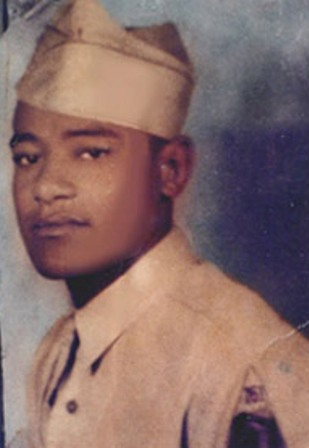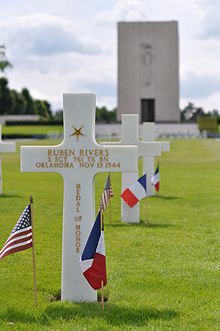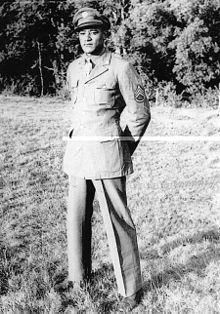
Good Morning POU!
We continue honoring our Medal of Honor recipients. Today’s honoree was a member of the famed 761st Tank Battalion during World War II. Read more about “Black Panthers” as they were called, in the POU archives here.
Ruben Rivers
Ruben Rivers (1921 – November 19, 1944) was a Staff Sergeant in the 761st Tank Battalion, a black tank battalion which served with distinction in the European Theater of Operations during World War II. Sgt. Rivers, who was half-Cherokee, was one of seven African-American soldiers to receive the Medal of Honor, although this official recognition of their heroic actions was not made until 1997.
Rivers was born to Willie and Lillian Rivers in 1921 in Tecumseh, Oklahoma. He grew up in nearby Hotulka, Oklahoma, where he and his eleven brothers and sisters worked on the family farm. After graduating from high school, Rivers worked on the railroad for a time.
With the United States’ entry into World War II on behalf of the Allied cause, Rivers and two of his brothers joined the armed forces. Ruben would be the only one assigned to a combat unit however, training with the 761st Tank Battalion at Camp Hood in Texas. Nicknamed the “Black Panthers,” they were eventually assigned to General George S. Patton’s US Third Army. Despite Patton’s racism, the battalion was implemented and performed with distinction in a number of important battles, although Patton himself never officially recognized their accomplishments.
Rivers would play a critical role in some of the earliest action the 761st would see, becoming the battalion’s initial hero, but also one of its first casualties. Shortly after arriving in Europe in the fall of 1944, the 761st was chosen by Patton to be part of his Saar Campaign in the Allied drive to the Siegfried Line. On November 8, 1944, Rivers and the others in the 761st’s Able Company were launched with the 104th Infantry Regiment in an attack on German positions near Vic-sur-Seille in northeastern France. As they approached the town via a narrow road, a roadblock improvised by the Germans using a felled tree and several mines stopped the progress of the tanks and infantry. The Germans soon trained their mortar and rifle fire on infantrymen stranded in the roadside ditches, and the situation threatened to produce heavy casualties very quickly. Rivers, positioned in the lead tank, realized that following protocol would fail to alleviate the situation. Instead he took action that resulted in the battalion’s first Silver Star. His heroic efforts are recounted below in the official medal citation:
During the daylight attack … Staff Sergeant Rivers, a tank platoon sergeant, was in the lead tank when a road block was encountered which held up the advance. With utter disregard for his personal safety, Staff Sergeant Rivers courageously dismounted from his tank in the face of directed enemy small arms fire, attached a cable to the road block and moved it off the road, thus permitting the combat team to proceed. His prompt action thus prevented a serious delay in the offensive action and was instrumental in the successful assault and capture of the town. His brilliant display of initiative, courage and devotion to duty reflect the highest credit upon Staff Sergeant Rivers and the armed forces of the United States.
Unfortunately, the medal would have to be awarded posthumously. A little more than a week later Rivers would again distinguish himself leading the platoon, but this time he himself would not be so fortunate. On November 16 Able Company, with Rivers in the lead tank, would lead another assault. This time the target was German positions in Guebling. On the way into the town, Rivers’ tank hit a mine, disabling it and leaving Rivers with a significant injury. Shrapnel had cut his leg from knee to thigh and as deep as the bone. His commanding officer, Captain David J. Williams, later remembered what happened when he and the rest of the company came to aid Rivers:
With the morphine needle in my right hand about a half inch from Sergeant Rivers’ leg, I could have told my sergeant to hold him down. I said, “Ruben, you’re going back. You’ve got a million-dollar wound. You’re going back to Tecumseh. You’re getting out of this. You got a Silver Star and a Purple Heart.” He says, “Captain, you’re going to need me.” I said, “I’m giving you a direct order! You’re going back!” I said, Medics, get the stretcher.” He pushed the needle away and got up. He said, “This is one order, the only order I’ll ever disobey.”
Allowing the medics to only clean and dress the wound, Rivers took command of another tank and, as the Germans had begun to mark the area for heavy artillery fire, moved to take cover with the rest of Able Company. It would not be until the morning of November 19 that the 761st would again push forward, but by now Rivers condition had seriously deteriorated. A dangerous infection had developed, threatening the loss of life and limb, and the wound was visibly causing a great deal of pain. Rivers had been urged to evacuate the night before, but he had again refused to leave the field. As usual his tank led the way, but while advancing toward German positions near the town of Bougaltroff the Panthers came under extraordinarily heavy fire. Williams ordered the remaining tanks to pull back, but Rivers had located the German anti-tank unit and, with one other tank, moved to fire on the area and cover the retreat. In the process, Rivers was fully exposed, and the Germans quickly trained their fire on his tank, landing two direct hits with high-explosive shells. Rivers was killed instantly.

SSG Ruben Rivers’ gravesite at Lorraine American Cemetery in Saint Avold, France


